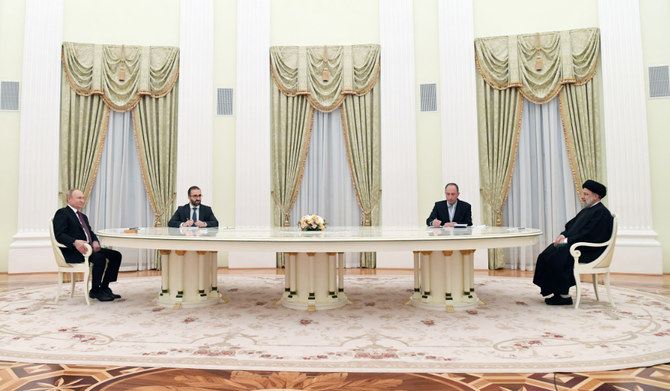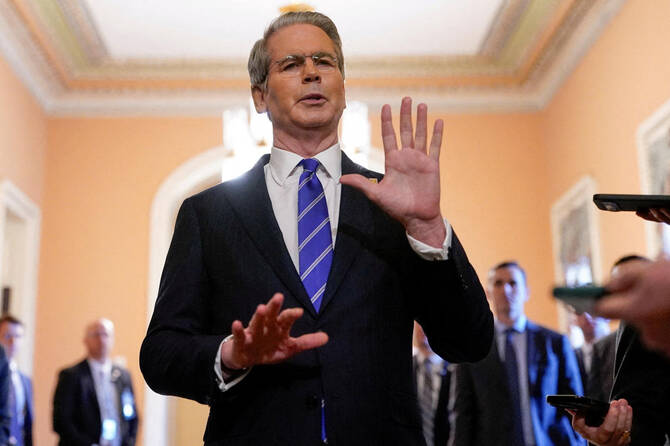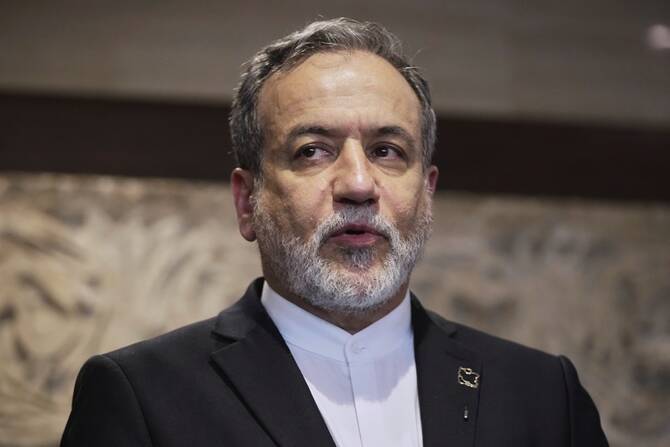TEHRAN: During its 1979 Islamic Revolution, Iran embraced the protest cry of “neither East nor West,” rejecting both the US and the Soviet Union, then locked in the Cold War. The phrase to this day hangs over the doors of Iran’s Foreign Ministry.
Russia’s war on Ukraine, however, has exposed just how much Tehran has tilted toward Moscow in recent years as the collapse of its nuclear deal with world powers stoked decades-old, hard-line anger at America.
Members of Iran’s paramilitary Revolutionary Guard train on Russian surface-to-air missile systems and aircraft. Hard-line President Ebrahim Raisi visited Russian President Vladimir Putin on one of his first trips abroad.
The war also exposes deeper fault lines even within Iran’s domestic politics. Among ordinary Iranians, there is a great deal of sympathy for Ukraine, a nation that staged a pro-democracy “Orange Revolution” similar to the “Green Revolution” that shook Iran more than a decade ago but was forcefully put down.
Iran’s historic enmity with Russia has combined with a wider feeling among some that backing Moscow betrays the Islamic Republic’s often-stated message that it stands against the world’s major powers.
“We have to help oppressed people of Ukraine as we do support people of Palestine and Yemen simply because they are targeted by powers,” said Zohreh Ahmadi, a mother of two in downtown Tehran’s Sarcheshmeh neighborhood. “A bullying power is killing children and women in Ukraine.”
Iran’s state-controlled television network, whose English-language service Press TV describes itself as “the voice of the voiceless,” hews close to Russian talking points.
It used Moscow’s euphemistic term “special operation” to describe the war’s early days. Stories referencing the killings of civilians in Bucha by Russian forces include headlines falsely describing it as a “fake attack” or “provocation” on Press TV’s website.
Part of the Iranian government’s anger at Ukraine likely stems from the aftermath of the Guard’s 2020 shooting down of a Ukrainian airliner, which killed 176 people on board.
Tehran denied for days it shot down the plane before saying troops made a mistake after Iran fired ballistic missiles at US forces in Iraq in response to the killing of a top general.
Ukraine’s criticism of Iran grew more direct as time went on. That’s something Tehran’s Friday prayer leader, Kazem Sedighi, mentioned in a March sermon after Russia began its war on Ukraine.
“In the case of the airplane, Ukraine misbehaved against us and misused it in support of the US,” Sedighi said.
He also engaged in the “whataboutism” common in both Iranian and Russian state media — bringing up a separate topic to charge hypocrisy while deflecting the issue at hand.
“Wars claim the lives of innocent people in Yemen and Syria but there is huge propaganda over Ukraine and this is racism,” Sedighi said.
Supreme Leader Ayatollah Ali Khamenei, who has the final say on all matters of state, said his nation opposed “war and destruction” while blaming America for the conflict. He also brought up a longtime suspicion that he shares with Putin — that the US, rather than ordinary citizens, fuels what he described as the “color coups” that back democracy.
For Khamenei, it is the memory of the Green Movement protests that followed Iran’s disputed 2009 presidential election that directly challenged the theocracy he leads. Iran’s security services used violence and mass arrests to put down the demonstrations. But unrest has re-emerged in recent years over economic issues.
For Putin, it is Ukraine’s 2004 Orange Revolution and its later Maidan protest movement that dislodged the Kremlin-leaning politician Viktor Yanukovych.
On the streets of Tehran recently, 17 people were willing to speak to an Associated Press journalist about the war, with others declining. Of them, 12 supported Ukraine, three reiterated Iran’s official stance and two supported Russia.
“I support Ukraine,” said Sajjad, a 26-year-old computer programmer. Like others, he spoke on condition he is identified only by his first name for fear of reprisals. “Russians are killing innocent people for nothing. Why should we remain silent?”
A retired Iranian captain, Mehrdad, called Russia’s reasons for the war “ridiculous” and similar to those used by Iraqi dictator Saddam Hussein to launch a bloody eight-year war on Iran in the 1980s. Saddam at the time pointed to supporting Iran’s Arab minority in its oil-rich southwest as a justification for his invasion.
“It is stealing Saddam’s reasons for attacking Iran — possible threats by revolutionary Iran and supporting an ethnic group,” said Mehrdad, 75. “By this excuse, every country can attack others — even Russia.”
Ali Nemati, a 64-year-old retired teacher, praised Putin as “very brave” for challenging NATO, also a new preoccupation of Iran’s hard-line government under Raisi. However, Iran has been living quietly next to Turkey, which joined NATO in 1952.
“Iran should support Russia since it is alone in its fight against imperialism,” Nemati said.
AP






















